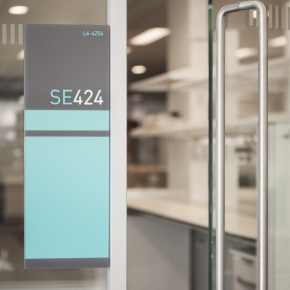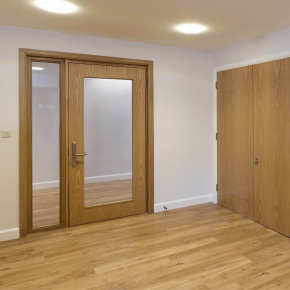
Architectural Ironmongery: hold the spec
Paul Smith Dip, G.A.I, UK Sales Director at Allgood, explores how a detailed understanding of ironmongery specification along with clear, collaborative dialogue with key stakeholders can save time, cost and resources.
From foundations to the intricate details of surface finishes, the construction of any building can be a lengthy process that requires meticulous cohesion and precise planning.
 Especially true in larger projects, any disconnect or lack of communication between stakeholders such as sub-contractors and architects can lead to the importance of original product specifications being lost when it comes to the later stages of the construction process.
Especially true in larger projects, any disconnect or lack of communication between stakeholders such as sub-contractors and architects can lead to the importance of original product specifications being lost when it comes to the later stages of the construction process.
Owing to the late stage in which it is installed, this is particularly pertinent for architectural ironmongery. Installed during the seventh stage of construction, prior to finishing touches and completion in stage eight, ironmongery is often subject to value engineering.
Originating in World War II during a materials shortage, value engineering is used to solve problems and identify and eliminate unnecessary costs, whilst improving or maintaining function and quality. For the construction industry, the process takes a holistic approach, encompassing the availability and cost of materials, construction methods, transportation, and site limitations as well as planning and organisation. Benefits that can be delivered through appropriate and informed value engineering include reduced lifecycle costs, improved quality and a reduction in environmental impacts and waste.
When considering ironmongery within this process, there is room for flexibility; however, certain elements of the specification cannot be conceded without impacting upon the product’s durability, reliability, and lifespan. This is often the case if the process is not undertaken in an open and collaborative manner, incorporating key stakeholders from across the supply chain.
For example, if a door is located in a high usage area it will require the specification of a durable and high-quality hinge, door closer and lever handle. Using a product that does not meet these requirements would result in premature replacement, eradicating any negligible benefit from the value engineering process.
The cost of the ironmongery is influenced by a multitude of factors, such as design, functionality, legislative compliance and aesthetic finish. Aspects such as the design and aesthetic finish can be value engineered to more modest and cost effective designs to reduce demands on budget.
The pillar of the specification – legislative compliance, must remain unchanged throughout the value engineering process. This key factor ensures that the specified ironmongery is suitable and tested for use in its specific environment.
Alongside legislative compliance, it is important to also consider the chain reaction of events following value engineering as well as the ironmongery functionality, safety and longevity.
For instance, a lower cost ironmongery solution that meets necessary legislation and testing standards may reduce demands on a project budget. However, this is no guarantee that the ironmongery is durable enough to withstand the demands of the building environment in which it is fitted. If this proves to be the case, it will inevitably require replacing. Therefore, an exercise designed to save money at the construction stage could lead to greater overall costs during the lifecycle of the building, negating the original value engineering.
For the value engineering process to achieve its true potential – solve problems and identify and eliminate unnecessary costs, whilst improving or maintaining function and quality – it should be undertaken with an open and honest dialogue with qualified and experienced professionals from across the supply chain.
By working alongside ironmongery experts, such as Allgood, unrivalled insight can be gained, allowing the process to be as smooth and effective as possible, leading to cost and time savings.
With an ironmongery solution for every application, Allgood has a host of products suitable for specific environments. For example, the Allgood Contego ironmongery range is created from an antimicrobial copper alloy, which means it continuously kills microbes within two hours of contact, as the antimicrobial properties are intrinsic to the material itself. Ideal for hospitals and healthcare environments, the hardwearing range not only meets the high usage demands of a hospital but also provides added value by eradicating one of the most common links in the chain of infection.
For commercial environments with a high occupancy, a durable and reliable ironmongery solution is required. Supplied with a 25-year warranty and manufactured from grade 316 solid stainless steel, the Allgood Modric range presents a cost effective and long-term solution for the busiest of environments.
In addition, for projects with a more stringent budget Allgood developed the Alite ironmongery range. During the installation of more than 100 doors and Alite ironmongery sets within a Glasgow City Council residential building, Allgood’s technical expertise was indispensable when providing technical advice and guidance for the ironmongery most suited to the project brief.
A robust range, Alite was developed with local government projects in mind to provide a durable commercial product at a cost effective price. As such, Alite lever handles, WC signs, fire door signs along with door signage and spyholes were installed throughout the communal residence.
Value engineering can produce significant savings in terms of cost, time, and waste. Through an open and honest dialogue with ironmongery professionals, key elements of the specification – the architect’s vision and legislative compliance – can be safeguarded and true savings found.
Contact:
Allgood plc
18 Holborn
London
EC1N 2LE
United Kingdom
Phone: 0207 387 9951
Fax: 0207 387 2549
Visit Supplier's page
Latest news

8th April 2025
First look at industry speakers for GEO Business 2025
GEO Business, the UK’s premier geospatial event, is set to return to ExCeL London on 4 – 5 June 2025, bringing together the brightest minds in the industry.
Posted in Articles, Building Industry Events, Building Industry News, Building Products & Structures, Building Services, Exhibitions and Conferences, Information Technology, Innovations & New Products, Restoration & Refurbishment, Retrofit & Renovation, Seminars
8th April 2025
Digital Construction Week 2025 announces first wave of industry-leading speakers
Digital Construction Week (DCW), the UK’s premier event for digital innovation in the built environment, is set to return to ExCeL London on 4 – 5 June 2025.
Posted in Articles, BIM, Infrastructure & CAD Software, Building Industry Events, Building Industry News, Building Products & Structures, Building Services, Building Systems, Civil Engineering, Exhibitions and Conferences, Hard Landscaping & Walkways, Health & Safety, Information Technology, Innovations & New Products, Landscaping, Retrofit & Renovation, Seminars
7th April 2025
Abloy UK provides bespoke access control solution for CPA Group’s Lanarkshire HQ
Abloy UK has supplied CPA Group with its PROTEC2 CLIQ solution to streamline access control and protect assets at its headquarters in Shotts, Lanarkshire.
Posted in Access Control & Door Entry Systems, Architectural Ironmongery, Articles, Building Industry News, Building Products & Structures, Building Services, Case Studies, Doors, Facility Management & Building Services, Health & Safety, Restoration & Refurbishment, Retrofit & Renovation, Security and Fire Protection
7th April 2025
ASSA ABLOY EMEIA: A new generation of reader is added to the Aperio digital access family
There is now a way to control access digitally, effectively and wire-free, thanks to ASSA ABLOY EMEIA…
Posted in Access Control & Door Entry Systems, Architectural Ironmongery, Articles, Building Industry News, Building Products & Structures, Building Services, Doors, Facility Management & Building Services, Health & Safety, Information Technology, Innovations & New Products, Posts, Retrofit & Renovation, Security and Fire Protection
 Sign up:
Sign up: